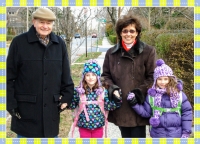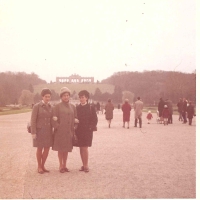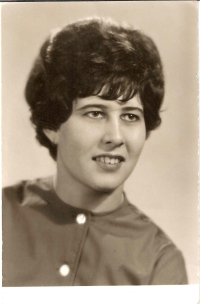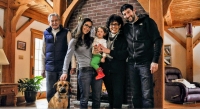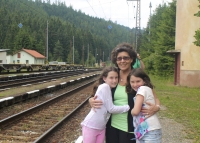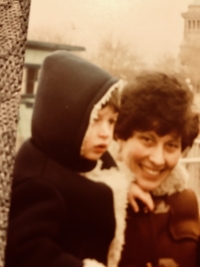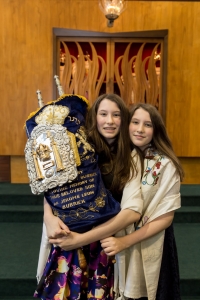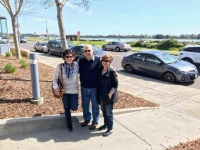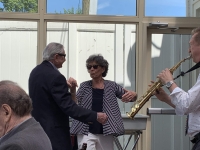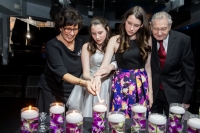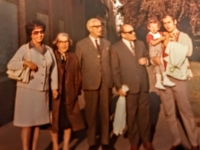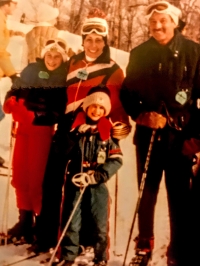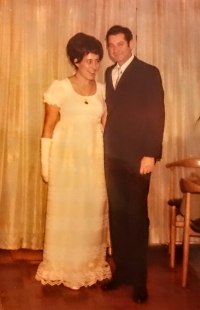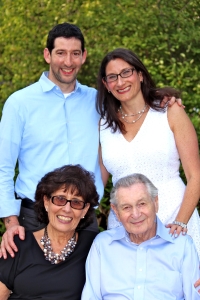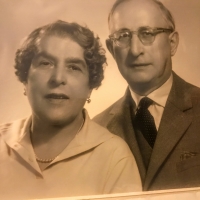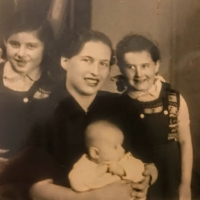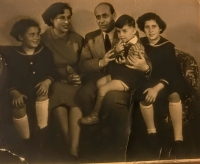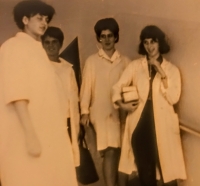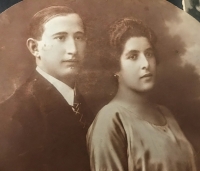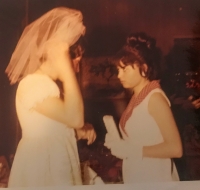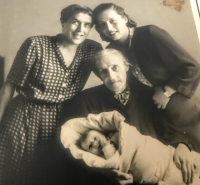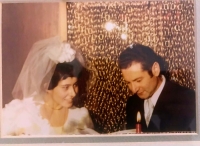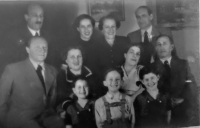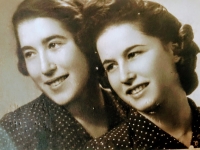Dana (Danielle) Vago
* 1945
-
"A tam bolo treba urobiť rozhodnutie, a to bolo prvýkrát, keď ja som bola konfrontovaná s tým slovom žid, no a vtedy prišla Tamara za mnou a povedala, že: `Dana ja som židovka, a ja chcem ísť do Izraela,,` no a ja som úplne ja som nevedela ani slovo, nemohla som, čo povedať, ja som, že: `Tamara, ja som tiež Židovka!` a Tamara, že: `A čo si myslíš, že ja som to nevedela?` A ja som bola prekvapená, že jak si to mohla vedieť, ale tak jej rodičia vedeli, že moji rodičia sú židia, tak proste židia o sebe vedeli, len ja som nevedela, že oni o sebe vedeli, len ja som nevedela, že oni sú židia."
-
"Hreje ma to pri duši, že aspoň meno zostalo, ale to je tiež taká zaujímavá story okolo toho mena, že ja som mala byť Daniela ako moja sesternica Daniela, ale mama bola taká traumatizovaná, keď som sa narodila, keď mala vypísať môj rodný list, že bála sa napísať Daniela, myslela si, že Daniela znie príliš internacionálne, proste, že to nie je dosť slovenské, tak napísala Danka, čo nemali dohodu s otcom, mala som byť Daniela. A tiež proste bola taká traumatizovaná pri mojom pôrode, že tiež svoje meno nenapísala správne, svoje rodné meno, ona sa volala Schlesingerová a nebola schopná proste napísať svoje židovské meno do môjho rodného listu, napísala meno, ktoré si môj starý otec po vojne zmenil zo Schlesinger na Slezák, tak mama napísala, že sa volala Slezáková, takže nikdy sa ona nevolala Slezáková, takže ja ešte doteraz mám v mojom rodnom liste Danka rodená Slezáková, ale nikdy som to meno Danka nepoužívala, vždy som používala Daniela alebo Dana. A tiež napísala v rodnom liste, že som náboženstvo evanjelické, takže je jasné, aká musela byť traumatizovaná."
-
"Jedna story bola, čo nevieme, či je pravdivá, nejaká preživšia Bratislavčanka, keď na pochode smrti išli cez Ravensbrück vraj, tak to bola story, ktorú povedala mojim starým rodičom, že keď prechádzali cez Ravensbrück, tak že videla Martu sedieť na ulici, mala odfarbené vlasy, to sme vedeli, že mala odfarbené vlasy, a že boli už vyrastené hodne a že jej povedala : `Marta poď s nami, ideme domov,` ale zdalo sa, že Marta bola pravdepodobne mučená podľa všetkého, nebola v poriadku mentálne, to bola story, ktorú sme dostali od jednej."
-
"Well, Tamara told me then," Dana, we're not going to any meetings, "And, well, we were still friends with a young woman and man, a young couple. We lived in a cabin together, so we were such a quaternion, and the agreement was that we wouldn't go to that meeting, that we would stick to each other, and that we would see what would happen. Well, as we were - as we listened to what was happening in Czechoslovakia, Tamara told me, "Dana, we're not going home," but so it was a big adventure. Wow, we're not going home. And so we slowly… so we made plans. We didn't have so much money, just what we got. Those were the lion course I think…
It is possible. Well, there's something like that.
Yes. That's how we are, so we're going to sell. So we go to the beach and sell everything we have. And we were… and then nylon stockings and, and underwear were sold there. It went a lot there then in Bulgaria it went a lot there. So we sold all our bras. My grandmother made me a dress like that, it actually looked like an apron. Also red checkered, it was a zipper and it had two sacks. That's how I got the one dress and maybe one bra, I don't even know if it was or not, now. And the others we sold everything to have as much money as possible and we gave it… we put it all together… the money we got and we bought, we bought a ticket… Tamara found someone who took us on a private plane. She was very clever and I don't even know how she did it. I probably wouldn't believe it if I didn't have it written in my diary. Like how we're all this, how this way of our emigration has progressed, but I have it written, so it really happened. And she found some private plane that took the four of us to the Bulgarian-Romanian border and there we were then… We then boarded one… there were already, there were a lot of buses crossing the border because the assembly I was talking about Bulgaria helped the Czechoslovak… Czechoslovak transport… put everyone on buses and send them home. We avoided it, but in the end when we wanted to cross the border into Romania, we got on one bus, so we went to Romania with a group.
Okay, and from Romania?
In Romania, in Romania, it was amazing for us. I should mention the atmosphere that prevailed in the world towards the Czechoslovaks. It was something wonderful how people behaved towards the Czechoslovaks. "
-
"You know, it was interesting that we had, we had - in the living room we had a secretary who served all kinds of purposes and there was ... it was also a library. And we were interested, we had three groups of books there. What we were, we have never known - my sister and I always saw only the first group and it was all communist manifestos and things like that. And it wasn't until we were teenagers that we miraculously found the third one. And imagine, the third group of books were, Jewish history and the Holocaust, and the terrifying images of war. And my sister and I were shocked, we had never seen or heard that before. So…
These were in a row in the library…
Behind the library, my father gave it so cleverly that we didn't know about it ourselves. We were such obedient girls that we didn't do anything that wasn't allowed.
And so you remembered well that you actually came into contact with the fact that you were of Jewish origin when you were seven years old and then actually in primary school, at the end of primary school.
Yes.
But, you already had it… you already had it explained at the time, didn't you?
No, never, It was never explained to me. It was never explained to me, they did Christmas, for example, didn't they? So a Christmas tree. Who didn't have a Christmas tree? Everyone had to have a Christmas tree. When my father said we wouldn't have a Christmas tree, we went crazy. How can we not have a Christmas tree? So Christmas was terribly traumatic for us because we demanded a Christmas tree and my father had such a conflict with himself. So there were years when he said well, we will make a Christmas tree. Well, so the poor man was worried that he often walked around the Christmas tree, he couldn't do it and he just had a problem decorating it. There was simply a conflict in it, but there were years when we had a Christmas tree with candies. There was nothing so sacred about it, but also with the candies. But we never had a real Christmas. ”
-
"And they had two daughters. The elder was called Marta, she was born in 1921, I mean twenty-one. My mother was born twenty-four… no she was two years younger, so twenty-two, I think. And at forty-three, they took my mother to Patrónka and, and that was just when the first girls' transport was, I think in forty-three in March, but it succeeded, some friends came out of the transport that she didn't go to Auschwitz, but then the grandmother's family, just the whole big family, eleven members, decided to hide in Bratislava. They managed to find some such, some, some dwelling in Emiháza… this settlement was called Emiháza. These were such unfinished barracks for workers, and there the whole Schwitzer family, eleven adults, were the youngest of them was my mother, eighteen-year-olds, and my great-grandmother was sixty-eight, the oldest. They hid there as a type of Anna Frank, so they couldn't do anything during the day. They couldn't do anything and they could cook a little in the evening, and so on… And my aunt, my mother's sister Marta, she was very brave, very active… she decided to do… How do you say it? Help against…
Resistance?
Resistance, well. So she left the shelter and joined the resistance in Bratislava. And she brought them news and helped as best she could, but they caught her at the end of the forty-fourth year in December. And unfortunately, she was allegedly tortured a lot and sent to Ravensbrück by the last transport, where she died. We heard - we then heard after the war from an acquaintance, a lady who was going through - going through the death march through Ravensbrück - and allegedly saw her sitting there. My Aunt Marta had her hair dyed when she was in the resistance, so she said she saw her there, that she had half her hair yellow and half her hair dark, but there was something that said that she went crazy about it. She was so terribly tortured and we don't know more about it. My grandparents never said a word about her. ”
-
Celé nahrávky
-
Vago Dana (Danielle)
(audio)
délka: 03:10:45
-
New York City, 30.11.2023
(audio)
délka: 02:02:28
Celé nahrávky jsou k dispozici pouze pro přihlášené uživatele.
„On the twenty-second of August we were to return, and on the twenty-first of August the Russians came, and my adventure ensued.“
Danielle Vago was born on August 12, 1945 in Palúdzka near Liptovský Mikuláš, into a jewish family. Since Dana was born shortly after the war, her mother was very frightened and decided to deny her origins. Her name in birth certificate was Danka Slezáková and she was also baptized. She has never explained her jewish origins, and she first heard about it when she was seven years old. Dana had a sister Marta, who was two years younger, and a brother, Juraj, eight years younger.
Dana‘s father Arnošt Unger and mother Edita Šlezingerová became Holocaust survivors. They married secretly, in 1943. After the wedding, Arnošt, as a lumberjack, managed to protect his love of life precisely thanks to the granted economic exemption. When the exemption expired, for a time they took refuge in the house of acquaintances, namely Gejza and Berta Party. However, it did not take long and they had to hide in the Liptov mountains. Their story had a happy ending, but this can no longer be said, for example, about Edita‘s sister Marta, who, as a member of the Bratislava resistance, was captured, tortured and taken to the Ravensbrück concentration camp in 1944, where she perished. Seven of his father‘s brothers also perished, so only he survived.
Dana and her siblings grew up in Bratislava, where they attended primary school in Kvačalová. This was followed by an 11-year-old school, the Grammar School, on Novohradská Street in Bratislava, which Dana successfully completed in 1962. The choice of the university was decided by her father, who was convinced of the great future of chemistry. Dana thus successfully completed SVŠT in Bratislava and graduated in May 1968.
Immediately after graduation, she was offered a holiday ticket to Bulgaria, where she learned about the occupation of Czechoslovakia by the Russians. She and her classmate Tamara decided not to return. A trip to Romania followed, and after an unsuccessful departure to Israel, Vienna became a destination for them. She was received by a family acquaintance, Magdalena Maierhofer, who offered her accommodation. Shortly afterwards, her mother and sister visited her with a request to return home. She did not agree, but her sister stayed with her in Vienna. They found a job in the chemical field and made their way through life. However, Dana was not happy and after meeting Mr. Verný, she decided to meet his acquaintance from America, Juraj Vago. She fell in love and emigrated again on December 27, 1970, but this time to New York. Then followed the marriage and the birth of Danas first daughter Michelle, in 1971. Dana‘s husband Juraj, worked as a mechanical engineer, who soon lost his job but received an offer from Lamas, with a job in Haag. The family spent two years in Holland, where their second child, son David, was born in 1975. This was followed by a return to America and the purchase of a house in New Jersey.
Dana‘s first job position after maternity leave was as a laboratory assistant in a freezing company. In 1980, she received an offer from Lamas, where she worked in the field of chemical engineering. After the company disbanded and both spouses were released, they moved to Connecticut, where they both found a good job. They lived there until their daughter Michelle needed help with the twins, so the Vago family decided for New Jersey again. At present, Dana‘s husband Juraj is no longer with us, but not a single day passes so that the witness of history does not remember him, and only at best. She has two successful children and grandchildren, to whom she is fully devoted.
